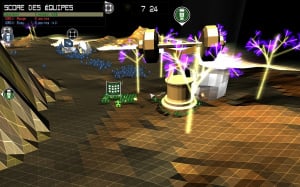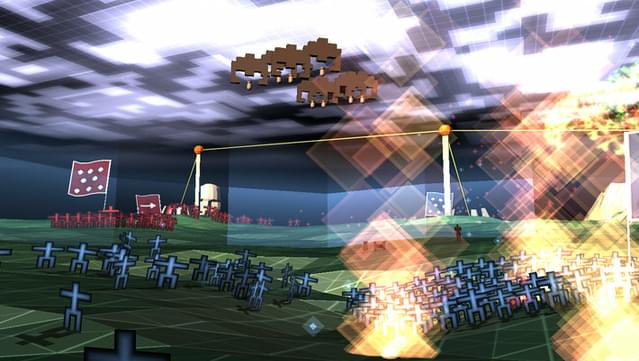

Throughout the game, you lead the Darwinians through several key locations within their world. This engagement is rarely felt in games, and it is what makes Darwinia an experience well-worth remembering. The population limit forces the player to focus on a single thing at a time, which slows down the pace of the game but increases the engagement you have with the Darwinians significantly. Units can be deleted at will, and new units can be created at various controlled locations around the map. There is no resource-harvesting present in the game, but players are limited to operating only 3 (or 5, when the ‘Task Manager’ is upgraded to the highest level) units at any one time. Almost all buildings in Darwinia and Multiwinia require the power of Darwinians to function. Though the turrets are incredibly powerful, the Darwinians that operate it are vulnerable to attack. These units can be improved by researching upgrades for them, which generally increases attributes like firing range or firepower. The other two units include the Engineer, an unarmed utility vehicle that can capture buildings and harvest the souls needed to build Darwinians, and the Armor, a APC capable of transforming into a formidable Darwinian-operated turret. Controlling units is a little clunky at times, as players are unable to adjust the camera angle while in this mode, but this is more than made up by the fact that the combat is far more engaging than in ‘conventional’ RTS games. While these squads are able to defend against single enemies just fine when left to their own devices, the player must take control of a squad when launching an attack on a virus-infested area, as the offensive powers of the units increase dramatically when under the direct control of a player.

The offensive unit can be ordered around or controlled directly. In order to help the Darwinians rebuild their civilization, the player is able to build three specific units. Mission can often only be completed by building a large population of Darwinians and transporting them safely across the map in order for them to operate certain machinery. However, players are able to exert some control over them by appointing Officers and using these to provide simple orders such as a move order or a ‘follow’ command. These Darwinians are autonomous and can therefore not be controlled directly. To succeed, the player must harvest the ‘souls’ left behind by defeat Virii and turn them into friendly Darwinians. The player is initially able to create a single type of combat unit and use this to combat the Virus. The game does not fit a particular genre, but comes closest to a crossover between a God game and a Real-Time Strategy (RTS) game. While Darwinia+ is unique in many ways, the world of Darwinia is especially memorable due to its unique design and quirky inhabitants. Over the course of many generations, the Darwinians have built a complete civilization with its very own religion and rebirth cycle. The world of Darwinia is inhabited by small creatures known as Darwinians. It is up to you, the player, to rescue the Darwinians from the virus and rebuild the Darwinian civilization. Unfortunately, Darwinia eventually comes under attack by a virus that all but annihilates the Darwinians.

Over the course of time, the Darwinians evolved and have become increasingly autonomous, slowly experimenting with the technology used by their creator to shape their world. The Darwinians, which inhabit this world, have existed for countless generations and have built up their own civilization, complete with a rebirth cycle and religion. This world exists entirely within a computer and is an experiment operated by a scientist. Now, almost five years later, Introversion has re-released the game and it’s multiplayer spin-off Multiwinia (2008) for the Xbox Live Arcade, under the name Darwinia+.Įverything in the Darwinia+ takes place in a virtual world known as Darwinia.
MULTIWINIA REVIEW SOFTWARE
When Introversion Software released Darwinia for the PC in 2005, it was clear that this game would fall into the latter category. The other option, is for developers to create a truly unique game that is worth remembering for the experience alone, which has brought us games like Braid and LittleBigPlanet. They can excel by taking a concept and improving upon it in such a way that it becomes a new milestone in gaming history, like Call of Duty: Modern Warfare and Starcraft did. In order to become an experience worth remembering, games can excel in one of two ways.


 0 kommentar(er)
0 kommentar(er)
